It is often suggested that Labour is profligate and the Tories are the naturally ‘safe pair of hands' when it comes to running the economy. The Tories, it is presumed, do not borrow as much as Labour. This is a hypothesis I have tested before. I thought it time to update to the end of the 2020/21 financial year.
The analysis that follows is based on government borrowing as reported by the House of Commons Library and other data supplied by the Office for Budget Responsibility.It covers years since 1946, which is the entire post-war period.
The government in office was decided by who was at the end of a financial year.
I then calculated the total net borrowing in Labour and Conservative years and averaged them by the number of years in office. All figures are stated billions of pounds in all the tables that follow and in this case are in original values i.e. in the prices of the periods when they actually occurred:
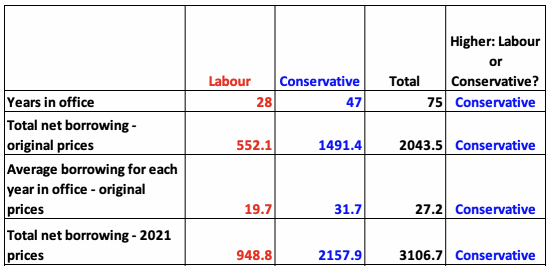
The Conservatives borrowed more, not just absolutely (which is unsurprising as they had more years in office), but on average.
This, though, is a bit unfair: the value of money changes over time. So I restated all borrowing in 2021 prices to eliminate the bias this gives rise to. This resulted in the following table:
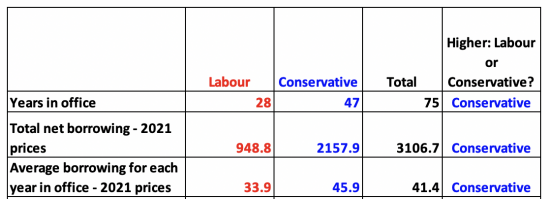
In current prices the Conservatives still borrowed more (much more) overall, and on average, by a long way.
So then I speculated that this may be distorted by events since 2008. That is what the Conservatives would claim, after all: they would say that they have spent eleven years clearing up Labour's mess. So I took those years out of account and looked at the first 62 years of the sample. I did this in 2021 prices to ensure I was applying a level playing field by eliminating inflation from consideration:
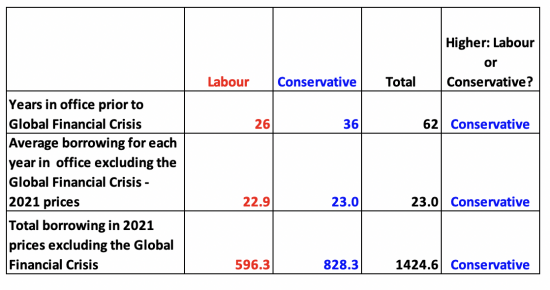
The Conservatives still borrowed more, after all, although it was a close run thing.
Then I speculated that this might be because Labour are good Keynesians: maybe they repaid national debt more often than the Conservatives. Or, to put it another way, they actually repaired the roof when the sun was shining. This is the data in terms of number of years:
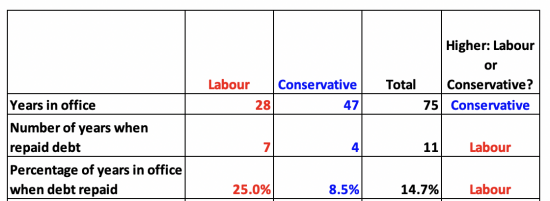
Labour do walk the talk: they repay national debt much more often in absolute and percentage terms than the Conservatives. In fact, one in four Labour years saw debt repaid. That was true in less than one in ten Conservative years.
But maybe the Conservatives repaid more. I checked that. This is the data in both original and current prices:
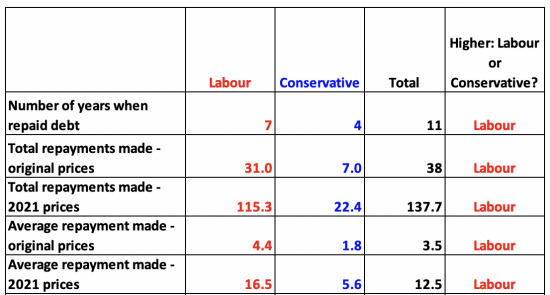
Labour not only repaid more often, it turns out: it also repaid much more in total and on average during each year when repayment was made.
So what do we learn? Two essential things, I suggest.
First, Labour borrows less than the Conservatives. The data shows that.
And second, Labour has always repaid debt more often than the Conservatives and has always repaid more debt, on average.
The trend does not vary however you do the data. I have tried time lagging it for example: it makes no difference.
Or, to put it another way, the Conservatives are the party of high UK borrowing and low debt repayment contrary to all popular belief.
For those interested, this is the overall summary table: the pattern in the right-hand column is really quite surprising:
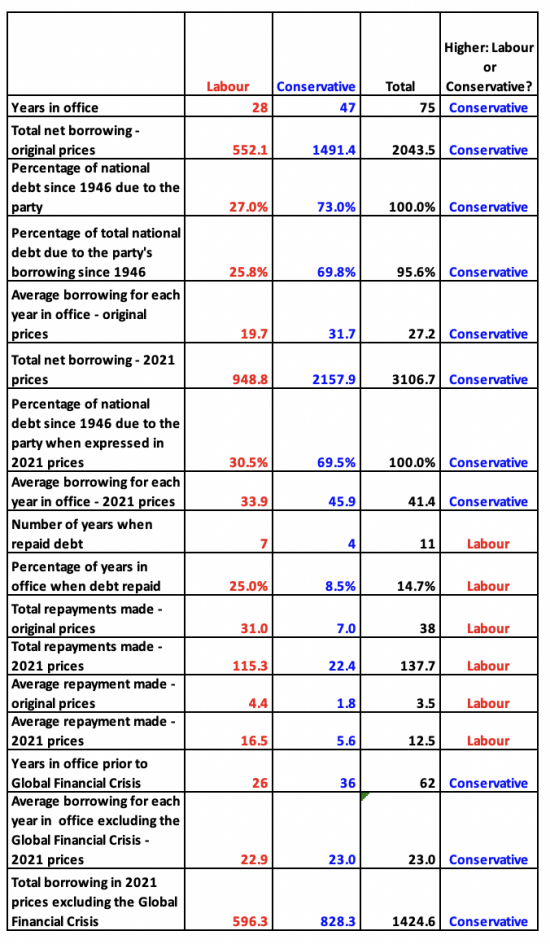
The pattern is very apparent. But so too is something else, and that is that no government since 1945 has really known how to cut spending enough to ever really cut the national debt. National debt repayments amount to about 4% of total borrowing in this period. That is completely insignificant and appropriate: the economy needs the money that the government injects into it by deficit spending to function.
However, there are increasing noises being made about austerity and the need to 'repay the debt', even though it is very apparent that politicians have no clue how to do this, and have no track record in doing so. Why are they in that case claiming the need to do something that has never happened, and likely never will? What is this wholly unnecessary distraction about? And why do we need to suffer austerity in the forlorn hope that debt might be repaid when it is apparent that not doing so has not caused harm, but the attempt to make repayment has?
Surely it is time for some politicians to call this out and say the claim that debt repayment is a priority is simply wrong, because the evidence shows that to be the case.
Data sources
The basic data on borrowing came from the House of Commons Library. This data is updated over time: figures will differ from earlier versions of this blog.
All other data comes from the Office for Budget Responsibility using the May 2021 data set.
Thanks for reading this post.
You can share this post on social media of your choice by clicking these icons:
You can subscribe to this blog's daily email here.
And if you would like to support this blog you can, here:



How do you square including QE in the borrowing figures in these tables.
You can’t repay debt you don’t owe.
I suggest finding another word for borrowing here. Or alternatively stop criticising those who call all deficit spending borrowing.
They say it is borrowing
I am challenging their narrative
From an objective, rather than political, viewpoint. Not convinced reducing “debt per se” is the objective. Recollection is that objective is to reduce “current borrowing from pension funds, etc” to “manageable fraction” of “economy”. Something to do with maintaining “credibility”? This is the Treasury’s agenda. What is their explanation?
“Why are they in that case claiming the need to do something that has never happened, and likely never will?”
Because politics is largely theatre; if it wasn’t Johnson would never, ever have been elected. For example, Johnson’s solution to PMQ’s is to answer questions about his Government’s obvious abject failures, and because he has no answer to any of the questions based on evidence or facts, virtually across the board; he reverts to a mock-serious comic turn (typically dressed as righteous indignation); solving the vacuity problem by answering every single question by blaming the Opposition for voting the wrong way in Parliament, in spite of the Opposition not having been in Government since 2010. Johnson’s essential argument is that he is the PM but the Government is nothing to with him or the Conservative Party; it is all the Opposition’s fault. So far the comic absurdity works; because famously common sense just doesn’t “cut through” with the electorate.
Johnson achieves this political success in Britain by the persona he assumes; presumably a personal take on a stock character from commedia del’arte (perhaps part Arlecchino, but mostly Pulcinella).
The only thing that isn’t understandable is why Unionists believe the Union can, or should survive this rubbish.
Agreed – ‘political theatre’ indeed.
And its a poor plot that just turns people off.
Underlying story is that Tories both create unnecessary recessions & lengthen recessions unnecessarily (early eighties, late eighties, big-bang crash of 2007, austerity of 2010, late lockdown). Less government spending giving less tax revenue & more benefit spending.
Slightly off topic…. nevertheless still relevant, businesses are now even more in need of govt financial support than before. Now is certainly not the time to reduce and pull the plug on govt spending
These guys really need to read and follow your blog and commentary as you’ve been saying all this from the get go.
‘The economy is rebounding very strongly, but our survey indicates liquidity issues for lots of businesses in the next 12 months. Government COVID support is being withdrawn and growing sales often requires additional funding. Lenders may take a more hard line approach should payments not be made or covenants breached with strong economy and COVID (hopefully largely) behind us…’
https://www.bloomberg.com/news/articles/2021-05-17/half-u-k-firms-foresee-struggles-with-debt-pwc-survey-finds
Over half of U.K. businesses expect to face a cash crunch within a year with recovering earnings failing to keep pace with the weight of debts on balance sheets, according to a survey by consultancy firm PwC.
The poll of 400 British executives found 55% anticipating a liquidity shortfall in the next 12 months with a similar number reporting they’d struggled to service debt payments within the past year.
….a quarter of respondents expect to reduce headcount in the next year. A third said they already had, according to the report.
Staff cuts could be even higher, meanwhile, as the U.K. government withdraws a jobs support program just as wage costs are rising, PwC said.
Over half of the respondents to the PwC survey said they experienced Brexit-related disruption in the past year, and a similar amount expect to face it this year. Moreover, 62% of the firms surveyed said they have experienced supply chain disruptions.
Thanks
I won’t say ‘ told you so’
Good. So now we have established that all the bleating about “Tory cuts” is a lie.
Glad we’ve established that.
It takes some extraordinary crassness to extrapolate as you do
The Tories cut massively
That is one reason why they had to borrow so much
Go and learn about the multiplier
Richard,
Your analysis – this whole piece really – is laughable. The method you have used is simply incorrect. If presented by even a GCSE level student as an answer, it would result in zero marks.
You make the elementary mistake of treating borrowing/budget deficits as independent. This of course is totally untrue.
Government spending carries over year to year, which means that a government does not start with a zero balance in any given year, or inherit one from it’s predecessors.
You clearly understand this, otherwise you would not have added the section regarding the post 2008 part of the data (though have ignored the post war years, inexplicably, which also negatively affect the Conservative figures in your answer).
Given you understand the issue, I’m not sure why you proceeded with what is obviously an incorrect method. I assume because it gave you the answer you wanted – at which point this whole article stops being analysis and is nothing more than party political propaganda.
The correct way to analyse this problem is to look at the record of each administration and compare.
Take the budget deficit as a percentage at the start of the administration and then at the end (or even year on year) and compare the changes over time, which are under a particular governments control.
To be even more accurate, you could normalise this for GDP growth – which would remove the effects of boom and busts from the data and give you an answer in terms of:
“change in budget deficit per unit of GDP growth”
This metric can be considered a measurement of how effective government spending has been.
Of course, economists have done this already. It turns out that Labour have a far worse record both in terms of the outright change in the budget deficit and in terms of the effectiveness of their spending. By quite a margin.
Which is why it should come as no surprise when people rightly label Labour governments as more profligate and less efficient (more wasteful) with their spending.
You do realise you are proposing a method that delivers just what you want – as your political comment at the end reveals?
And are you really saying 47 years of Tory deficits are all labours fault when much of the time they were in office for p[eriods of more than a decade?
Please tell me how that is the case, your bias apart?
I’d suggest that all the methodological failings are yours
The method I am “proposing” has the advantage that it does not rely on the outcome of previous year or governments. It does this by making each period (time in government or year) independent variables, only looking at the start and end point and the change between them.
Thus starting with a budget deficit of zero and ending with one of 5% is treated equally to starting with 5% and finishing with 10%. It does not matter what the previous time period or governments deficit was. So it is impossible to claim bias.
I hope this is clear.
The result from this shows that Labour increase the budget deficit more than the Conservatives.
I am quite surprised that you then are trying to claim that this method attempts to pin Conservative deficits on Labour, when by definition, each year or administration is considered independently by this method. The change is important, not the starting point, which removes the bias you are claiming.
The same can’t be said for your method. Given that you just look at the nominal (or inflation adjusted) amount borrowed, one could easily and rightly argue that much of one governments borrowing is attributable to the previous governments budget deficits. As I said, you clearly understand this concept, but now seem to be arguing against yourself – I can only thank you for making my point for me though.
If you expand the method I “proposed” to include normalising for GDP growth, you get and even more useful metric. After all, not everything is within governments control and deficits are likely to increase during a recession. Again, each year or administration period is treated independently, but now with this added step you remove the noise of the economic cycle from the result.
In effect, growing deficits in recessions and penalised far less harshly but growing deficits exceeding the growth of GDP are penalised far more.
Now, I hope we can agree that the data, being historical, we can take as accurate and not politically biased.
Given all of this, and using a method (unlike yours) which infers no bias either way, we find (as many others have already done) that on average Labour governments have increased budget deficits more than Conservative ones, and have been less efficient in that spending in terms of budget deficit to increase in GDP.
Your analysis is clearly wrong, because you have used a method which is flawed, for the reason I (and you) have pointed out. You seem to understand the problem with your method, yet you still went ahead and claimed the results it produced are correct. Clearly if the method is wrong, the results aren’t going to be correct.
I am not sure why you are persisting in defending what you have done – when you highlight the issues with it yourself. It’s bad economics (if you could even call it that) and bad mathematics. Which just leaves party political nonsense spreading.
But each year is not independent
What an absurd claim!
It’s like saying we can appraise the deficit in 21/22 without considering there was Covid
Why not just deal in facts?
Oh, and by the say, your postings do suggest you are likely to be a troll. Just saying….I can tell
Robin – if you’re so confident, please provide link(s) to these studies.
I admit, I am too lazy/busy to go chasing the numbers myself, but you make the arrival at your conclusions sound almost trivial, so surely you can provide such material?
Regardless, (and I’m inclined to believe Richard’s analysis, but I’m always interested in *well presented* data), the Labour years of ’97 – ’08 had a feeling of growing community prosperity. Something which has been lacking, in spades, since 2010, since when, everything has just felt in decline.
I understand (but reject) the arguments for austerity – If this is the mean place austerity gives us, I don’t want it. Not a bit.
Thanks Johan
Could I just add, at this point, Richard, that, contrary to Robin’s preferred narrative, since 1945, the underlying fact is that Labour governments have had to give too much time to sorting out Tory-created economic problems.
🙂
I will try and deal with all the comments in turn:
@ Richard Murphy
“But each year is not independent”
No, they are not in nominal debt terms. Which is what you have used. Which totally invalidates your method, given it does not take into account the fact that one government inherits a budget deficit (or surplus) from the previous.
As I have already said though, if you take the change in budget deficit over a period, they are now independent variables. It does matter what the value of each figure is, only the difference between them. At which point you are just measuring an increase or decrease. I’m pretty amazed you don’t seem to understand this.
As said before, Labour have more increases on average.
“It’s like saying we can appraise the deficit in 21/22 without considering there was Covid”
Indeed. Which is why I spoke about the idea of normalizing the change in budget deficit by GDP growth. This removes the “automatic stabiliser” penalty for growing budget deficits in times of recession, but increases the penalty for running larger deficits in times of growth.
Again, I am pretty amazed that a Professor of economics does not understand this.
“Why not just deal in facts?”
Why not. It is a fact that your method is incorrect, and does not show what you claim it to. You clearly understand the issue, given you remove the post 2008 data, but that still does not remove the problem of one government inheriting another’s deficits. Labour are flattered because they inherited a surplus in 1997, the Conservatives penalised because they inherited deficits from Wilson/Callaghan for example.
Using your method you could argue that opposite of what you say – that Tories end up having to deal with the large budget deficits bequeathed to them by Labour.
“Oh, and by the say, your postings do suggest you are likely to be a troll. Just saying….I can tell”
By pointing out that your method here is incorrect? I notice that you have been unable to defend it. If pointing out your errors or disagreeing with you makes me a troll…..
@ Johan G
The IFS look at the numbers in their Green Book regularly. The IMF and OECD also run similar statistics (for most countries) as part of their regular analytics set. I’m sure you can google for them.
“Regardless, (and I’m inclined to believe Richard’s analysis, but I’m always interested in *well presented* data), the Labour years of ’97 — ’08 had a feeling of growing community prosperity.”
Richard’s analysis is, to put it bluntly, useless. For the reasons I have pointed out. You cannot pretend that you can fairly assign dependent variables (nominal debt created in a year) to a particular government and the decisions they made, when the decisions of previous governments impact the starting situation. This should not be controversial in any way, at which point you simply cannot fairly come to the conclusion he has. Which begs the question why he has come to it.
As for community prosperity: that may well have been the case. You could say it is not surprising giving Labour were running increasing budget deficits in a period of strong growth. You’d hope people felt prosperous in such an environment.
The second metric I talked about is the more valuable one – and it in times like this such an efficiency measure makes Labour’s record look poor overall. Budget deficits increased over the period 97-08, but GDP growth actually steadily declined. In comparison, using the same metric, Labour actually looks better in 08-09 when budget deficits grew a lot, but the efficiency ratio looks better than many of their other years thanks to the large drop in GDP.
Such are the benefits of measuring independent variables and then normalising them. You can actually make sensible, unbiased comparisons.
Unfortunately for Labour, overall the data doesn’t lie. On average they have spent more (in the form of larger increases in budget deficits) and done so less efficiently (when you normalise for change in GDP).
So no references
And no argument
Just claims
And what you clearly do not appreciate is that because governments do not last a year all your attempts are invalidated but mine are not
Of course there is no one perfect method of doing this
But mine has the benefit of allowing for the fact that governments happen to be enduring and yours does not
I will not be posting further discussion because it is apparent that your claim is that you do not like Labour. We heard you. But the evidence does not support your claims
Ed Note:
This comment was deleted
All the characteristics of trolling are being shown by the commentator
@ Robin
I know you’ve already been banned, but your answer just isn’t good enough.
To paraphrase yourself – if an undergraduate gave me work like this, it wouldn’t even scrape a pass.
You provide only unsubstantiated claims as a rebuttal to actual worked numbers, and when asked to provide reference, all you provide is a command to google and then launch off into another tirade.
In response to your claim that it was only Labour running reckless budget deficits that made 97 – 08 feel more community prosperous. It doesn’t stand up to scrutiny. Well, the recklessness part anyway. I’m still waiting on the data for the other half of your claim…
Before 08 and even until election time in 2010, balanced budgets were never mentioned.
It’s illogical, to my mind, that government expenditure, which was improving everyone’s life, suddenly became impossible to carry out. Or, even more ridiculous, that government expenditure which had the effect of community improvement was no longer viable, but tax breaks (and more recently, massive amounts of QE into gov mates’ pockets’) were.
It just doesn’t stand up.
And that’s before we even start considering multiplier effects
“You make the elementary mistake of treating borrowing/budget deficits as independent. This of course is totally untrue.”
You later write: “The method I am ‘proposing’ has the advantage that it does not rely on the outcome of previous year or governments. It does this by making each period (time in government or year) independent variables, only looking at the start and end point and the change between them.”
I do not believe these statements sit very happily together. Personally, I would not have undertaken Richard’s analysis, but I think he nevertheless addresses a quite important point. Conservative governments possess a reputation for financial competence that has no credible basis, not now, not ever; not even in the seventeenth century. Even Bonar Law and his right-hand man through the war, Maynard Keynes thought Baldwin was a hopeless Chancellor. Bonar Law reputedly almost resigned as PM when he saw what kind of post-war debt deal Baldwin came back with from the US.
The aftermath of the financial crisis of 2007-8 by the Conservatives from 2010 was appallingly inept. The claim was that austerity would eliminate the deficit altogether. It didn’t. But the effect was terrible on economic growth (which would have improved matters); even as it failed to deliver a reduced national debt. Instead austerity made far, far worse a stagnant economic recovery compounding the negative effects (Osborne was so badly wrong he had to ease austerity slightly in 2012, before we fell of the cliff); a double failure of policy that far from eliminating the national debt, doubled it instead. Incidentally proving that the level of debt that Cameron, Osborne (and the whole Conservative-Neoliberal clamjamfry) claimed was unsustainable; proved only that it was not the debt that was not sustainable, but the credibility of Conservative policies that were transparently incompetent.
Notice that the end of austerity was actually announced triumphantly by the Conservative Government, without eliminating the debt, and by rampantly increasing the national debt. Work that one out.
Having doubled the debt, it has further increased on a large scale through the pandemic. Indeed it was austerity that stripped out spending by an ill-judged and disastrous centralising of NHS England to save money, which left us with insufficient PPE (having had £1Bn of sound PPE in 2010 for just such a pandemic), and a new centralised but outrageously expensive, failed, privatised £37Bn Test and Trace system because decentralised Public Health had been left in ruinous condition (the old system would have done a far more effective job at far, far less cost). The cost to the Treasury of these blunders alone is completely catastrophic in spending terms and deficit terms.
Do you really want to go through this in detail now, because it bodes ill for Conservative credibility if we rehearse now what will come out when Johnson stops kicking the Public Enquiry can down the road, and has to face the consequences?
You get my reason for offering the analysis right John
There are good reasons from an MMT perspective for challenging what I have done
But not from Robin’s
I could pick holes in my own work
He has not
“Labour are flattered because they inherited a surplus in 1997” Er, what surplus was that, Robin?
According to the figures I have in front of me from the spreadsheet from https://commonslibrary.parliament.uk/research-briefings/sn05745/ – public sector net borrowing was £27.7 billion in 1996/7 and £9 billion in 1997/8. But there were small surpluses in the next three years, 1998/9 1999/2000 and 2000/01.
(Taking this analysis on its own terms, Robin has a point about governments inheriting structural deficits, but perhaps he could provide us with a link to a specific report doing the analysis in the way he suggests rather than waving his hands and suggesting we find it ourselves.)
The propensity for the Tories to create debt is something I discovered in the book ‘The Economy Under Mrs Thatcher: 1979-1990’ (Penguin economics) Paperback — 29 Aug. 1991.
They not only presided over more perceived Government debt but wider debt in society too because big banking credit was let loose with its attendant destabilising effect on the economy.
Even in this book it was noted that Labour had to deal with the consequences. What then follows is that it hampers Government spending/investment during the Labour years and of course it is easy to blame those who pay off debt for causing it isn’t it, so Labour lose again with that false narrative.
The cunning of unreason eh? The Tories are past masters at it.
[…] based the article on a theme developed from the post I did here yesterday that showed which parties had borrowed more, and repaid most when in office at Westminster since […]
BUT……
Is it not better to “borrow” more and payback less?
How I hate the term “borrow”.